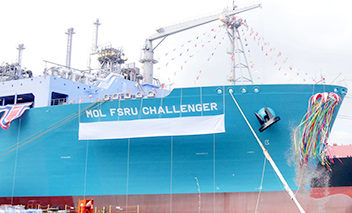BV Issues Guidance on Floating LNG Terminals
Paris-based standards and ship classification firm Bureau Veritas (BV) has issued new and updated guidance to support the construction and operation of new floating LNG import terminals and storage units.
Interest in Floating Storage and Regasification Units (FSRUs) and Floating Storage Units (FSUs) is growing, it said July 30, arguing that they offer operational flexibility, reduced timescales - from concept to operation, and cost effectiveness in comparison with onshore terminals.
Additionally, converting existing LNG carriers offers a fast route to operational availability, with more than 20 LNG carriers presently in laid-up condition. Many of them are candidates for conversion into FSRUs or FSUs, and BV says its new conversion guidelines provide clear advice to the LNG industry in properly addressing issues that either will or may arise during such conversions.
Its chief operating officer for marine & offshore Matthieu de Tugny said: "Working with industry stakeholders, we are providing the rule framework and guidance necessary to develop both FSRU and FSU terminals – both for newbuildings and conversions." BV classed the first newbuilt FSRU delivered in 2005. Likewise the largest FSRU ever built Mitsui OSK Lines' 263,000 m3 unit delivered in 2017 and deployed since early 2018 in Turkey is also BV-classed - as is almost 40% of the relevant fleet in service. (The photo below of that ship, the MOL FSRU Challenger, is courtesy of Mitsui OSK Lines)

Other ship classification firms serving the LNG sector including FSRUs and FSUs include: DNV GL, American Bureau of Shipping (ABS), Lloyd's Register, and Italy's Registro Italiano Navale (or Rina).



